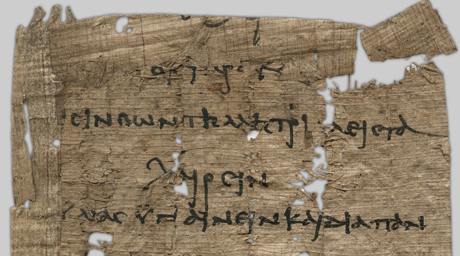
Papyri scraps rediscovered in UBC Library’s Rare Books and Special Collections (RBSC) are shedding light on life in ancient Egypt.
It’s believed that the small papyrus scraps, which fit in the palm of an adult hand, are the first of their kind in Western Canada. The scraps, written in Greek, date back to Roman-age Egypt, about 1,800 years ago. The pieces are made from the papyrus plant, a reed used to produce the ancient equivalent of paper. Both were excavated in Egypt and made their way to UBC in the 1930s.
“Together, they reveal intimate details of life in Roman Egypt,” said Toph Marshall, a professor at UBC’s department of classical, near eastern and religious studies (CNERS). “These documents are a window on a lost world, revealing the daily activities of ordinary people.”
The pieces have been stored at UBC Library since the 1930s. However, they remained largely unnoticed over the years, until 2014, when a PhD student in classics at UBC approached RBSC for a project. The RBSC librarian brought the papyri scraps to the student’s attention. The student alerted her professor, Marshall, who has since written a paper on the papyri.
The Library has digitized the papyri; and pictures are also available on Flickr.
Read the full media release from UBC News: “Window on a lost world”: rediscovered papyri at UBC shed light on ancient Egypt” (July 6).
A similar story also appeared in:
- Global News, “Ancient Egyptian papyri rediscovered in UBC library” (July 7)
- Global News video, “Two Roman-age Egyptian papyri rediscovered at UBC” (July 7)
- News.com.au, “Ancient Egypt’s social media – papyrus notes – offer rare insight of daily lives,” (July 10)
- VancityBuzz, “1,800 year-old dinner invitation re-discovered at UBC,” (July 9)
- University of Windsor news, “Professor helps re-discover lost Egyptian papyri” (July 13)
- CBC Radio One, Windsor, “Ancient Egyptian papyri rediscovered,” 6 minutes, (July 14)
- The Ubyssey, “Rare Books rediscovers 1,800 year old papyrus” (July 20)
- CBC News, “UBC papyrus scraps offer glimpse into everyday ancient life” (Aug. 10)